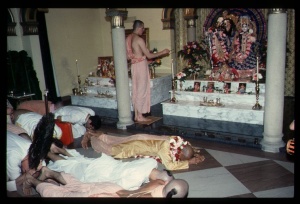CC Madhya 6.56: Difference between revisions
No edit summary |
(Vanibot #0054 edit - transform synonyms into clickable links, which search similar occurrences) |
||
| Line 17: | Line 17: | ||
<div class="synonyms"> | <div class="synonyms"> | ||
''sahajei'' | ''[//vanipedia.org/wiki/Special:VaniSearch?s=sahajei&tab=syno_o&ds=1 sahajei]'' — naturally; ''[//vanipedia.org/wiki/Special:VaniSearch?s=pūjya&tab=syno_o&ds=1 pūjya]'' — respectable; ''[//vanipedia.org/wiki/Special:VaniSearch?s=tumi&tab=syno_o&ds=1 tumi]'' — You; ''[//vanipedia.org/wiki/Special:VaniSearch?s=āre&tab=syno_o&ds=1 āre]'' — over and above this; ''[//vanipedia.org/wiki/Special:VaniSearch?s=ta’&tab=syno_o&ds=1 ta’]'' — certainly; ''[//vanipedia.org/wiki/Special:VaniSearch?s=sannyāsa&tab=syno_o&ds=1 sannyāsa]'' — the renounced order of life; ''[//vanipedia.org/wiki/Special:VaniSearch?s=ataeva&tab=syno_o&ds=1 ataeva]'' — therefore; ''[//vanipedia.org/wiki/Special:VaniSearch?s=haṅ&tab=syno_o&ds=1 haṅ]'' — am; ''[//vanipedia.org/wiki/Special:VaniSearch?s=tomāra&tab=syno_o&ds=1 tomāra]'' — Your; ''[//vanipedia.org/wiki/Special:VaniSearch?s=āmi&tab=syno_o&ds=1 āmi]'' — I; ''[//vanipedia.org/wiki/Special:VaniSearch?s=nija&tab=syno_o&ds=1 nija]-[//vanipedia.org/wiki/Special:VaniSearch?s=dāsa&tab=syno_o&ds=1 dāsa]'' — personal servant. | ||
</div> | </div> | ||
Latest revision as of 23:45, 19 February 2024

A.C. Bhaktivedanta Swami Prabhupada
TEXT 56
- ‘sahajei pūjya tumi, āre ta’ sannyāsa
- ataeva haṅ tomāra āmi nija-dāsa’
SYNONYMS
sahajei — naturally; pūjya — respectable; tumi — You; āre — over and above this; ta’ — certainly; sannyāsa — the renounced order of life; ataeva — therefore; haṅ — am; tomāra — Your; āmi — I; nija-dāsa — personal servant.
TRANSLATION
“You are naturally respectable. Besides, You are a sannyāsī; thus I wish to become Your personal servant.”
PURPORT
A sannyāsī is always to be worshiped and offered all kinds of respect by the gṛhasthas (householders). Although Sārvabhauma Bhaṭṭācārya was older than Śrī Caitanya Mahāprabhu, Sārvabhauma respected Him as a sannyāsī and as one who had attained the topmost platform of spiritual ecstasy. Thus the Bhaṭṭācārya certainly accepted Him as his master.